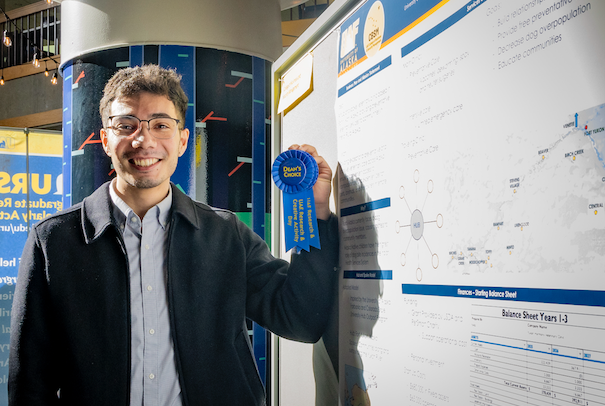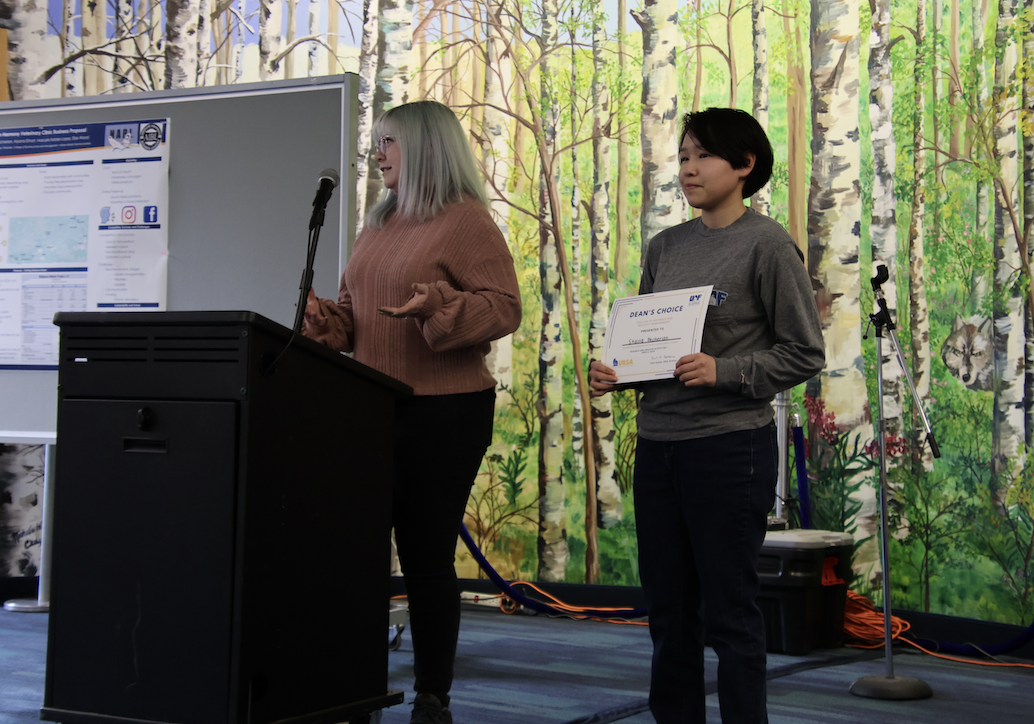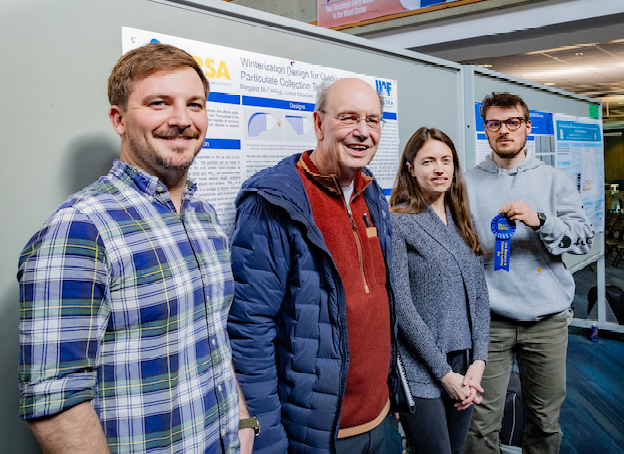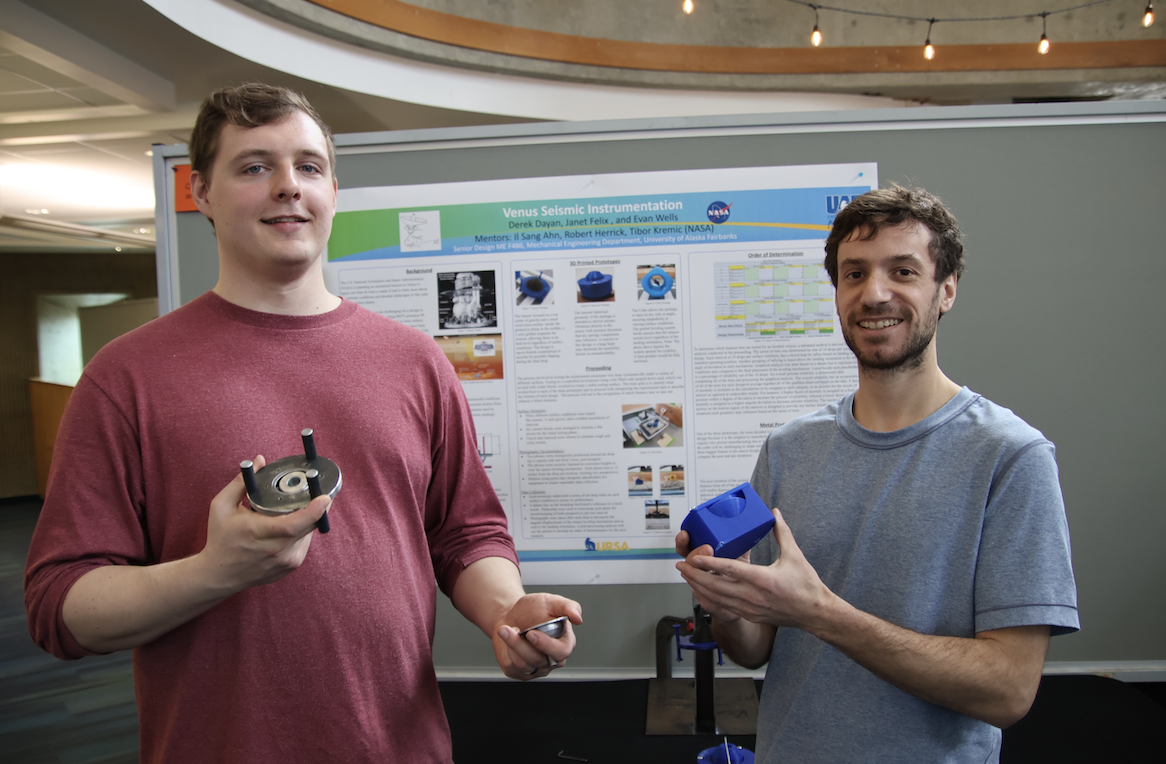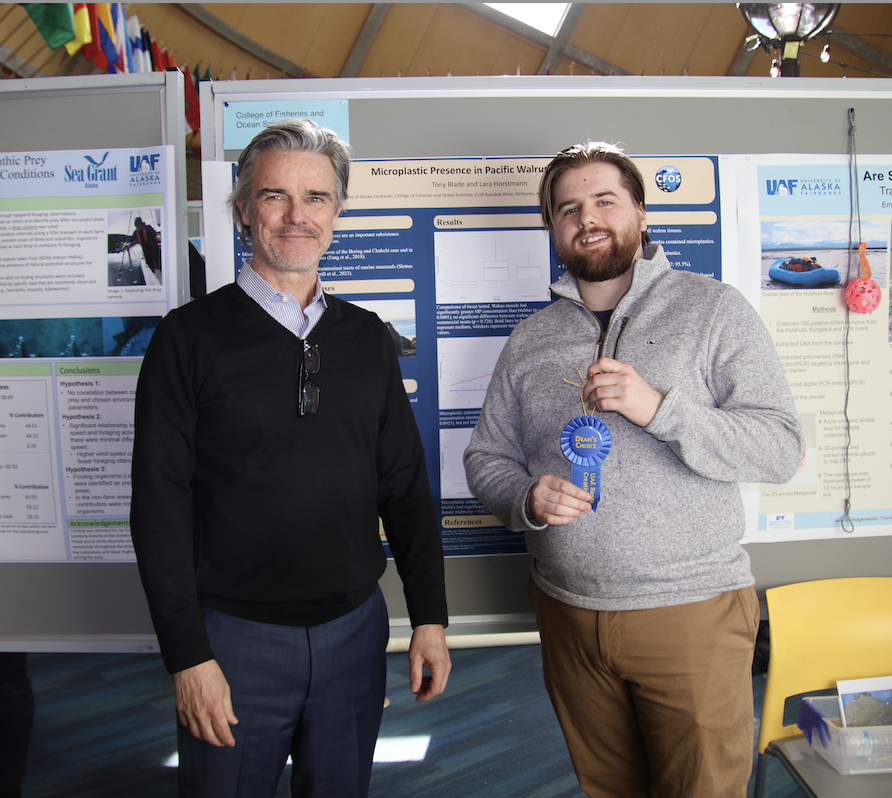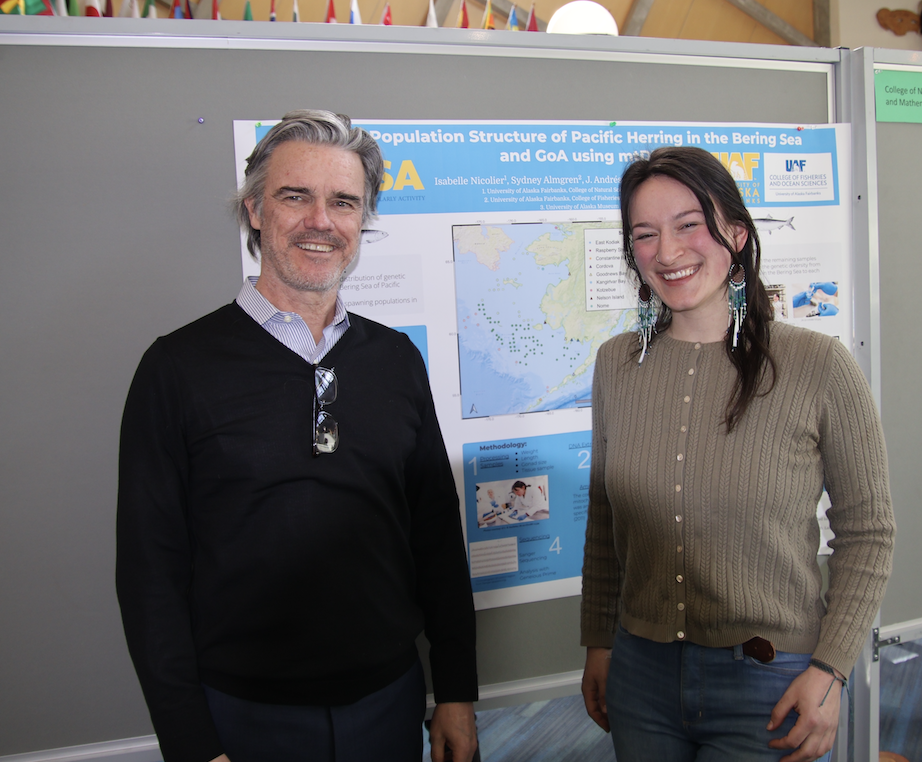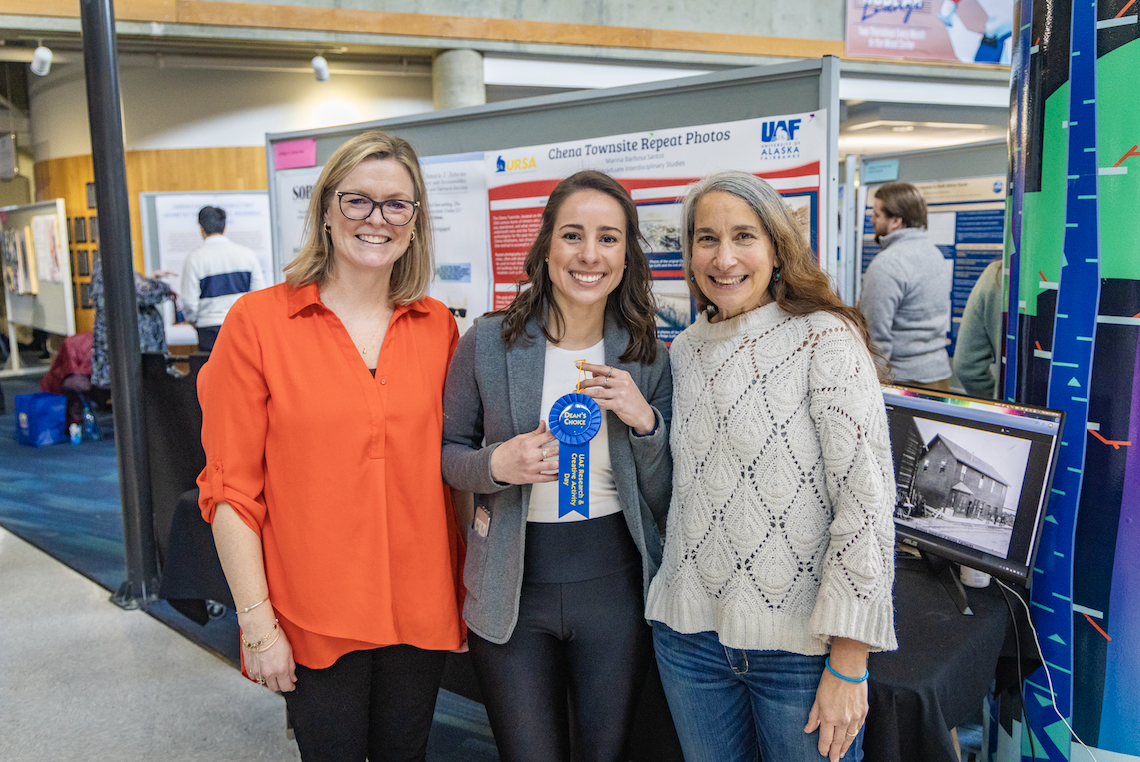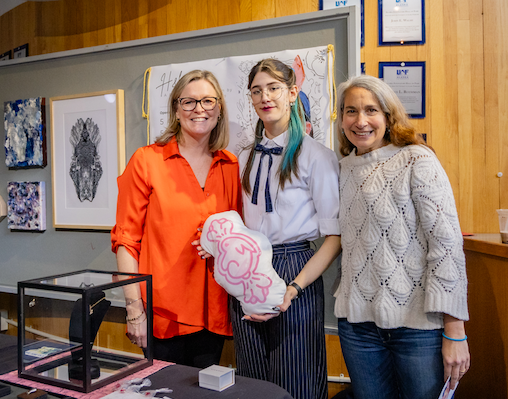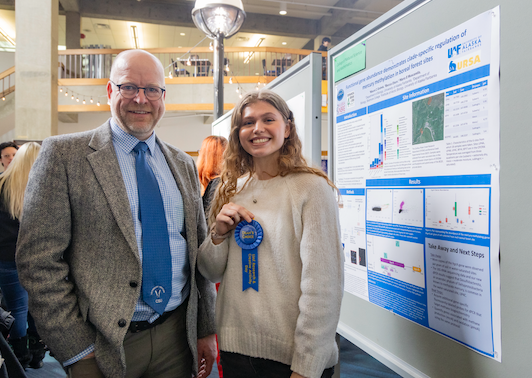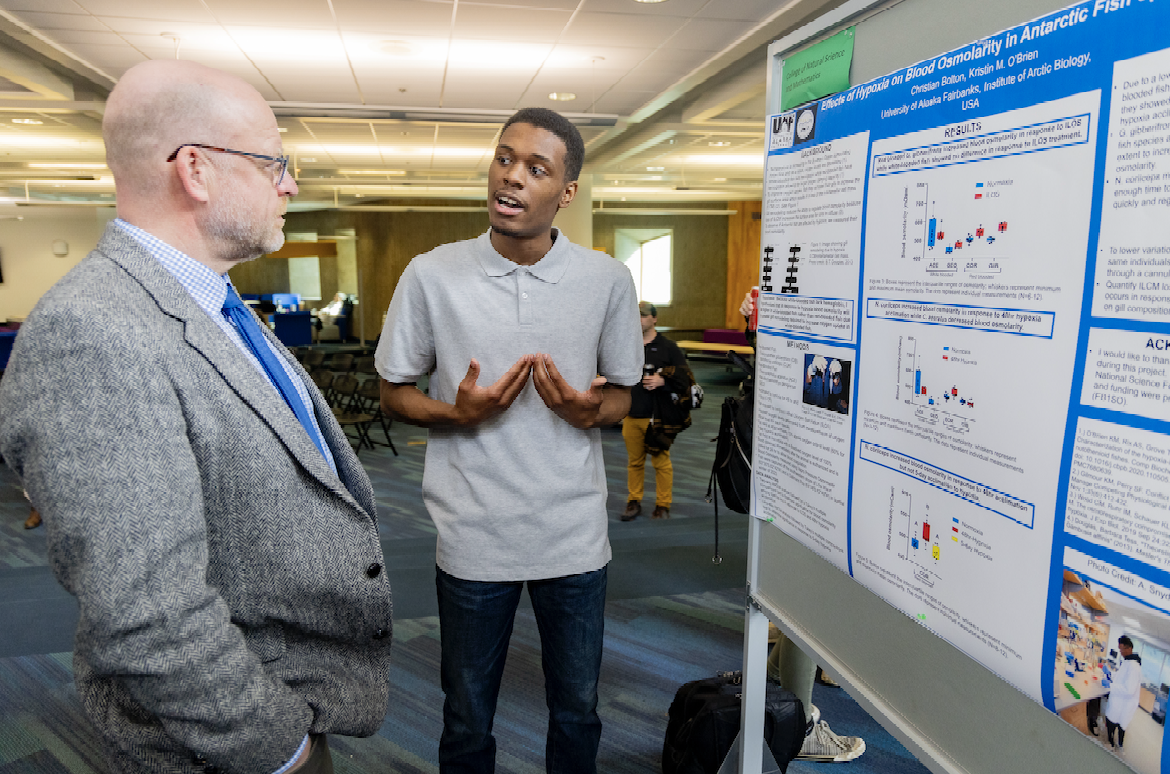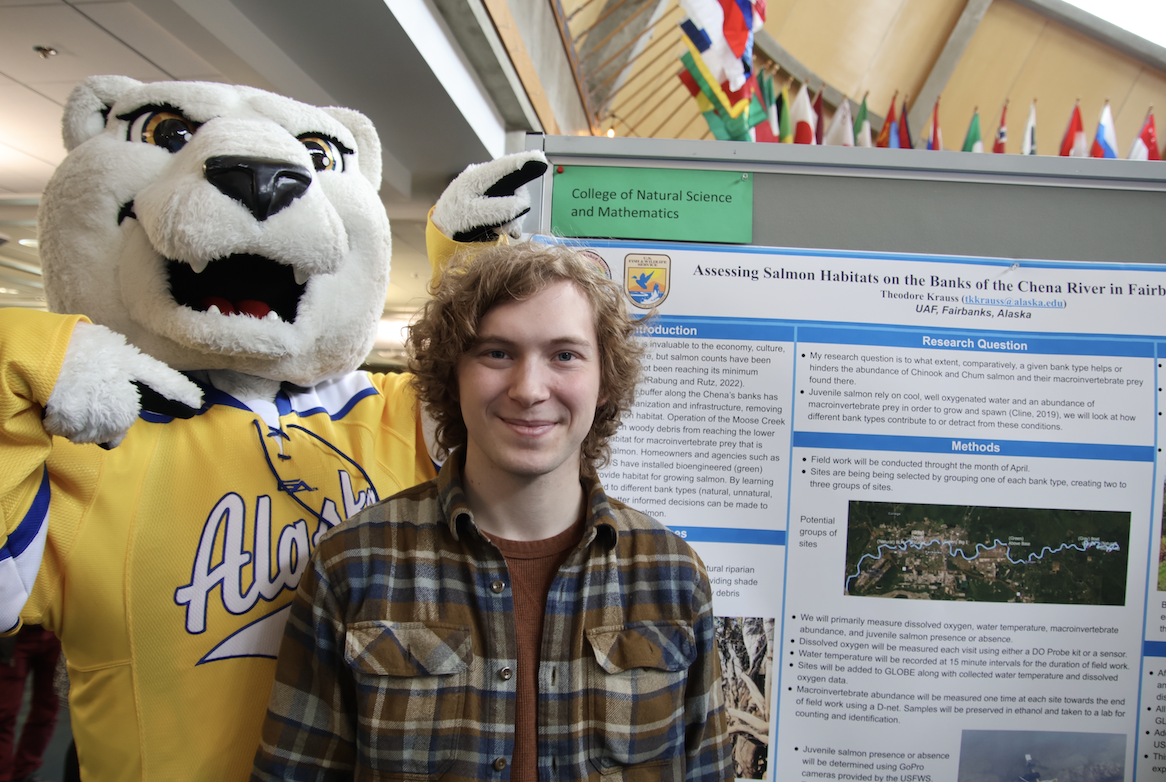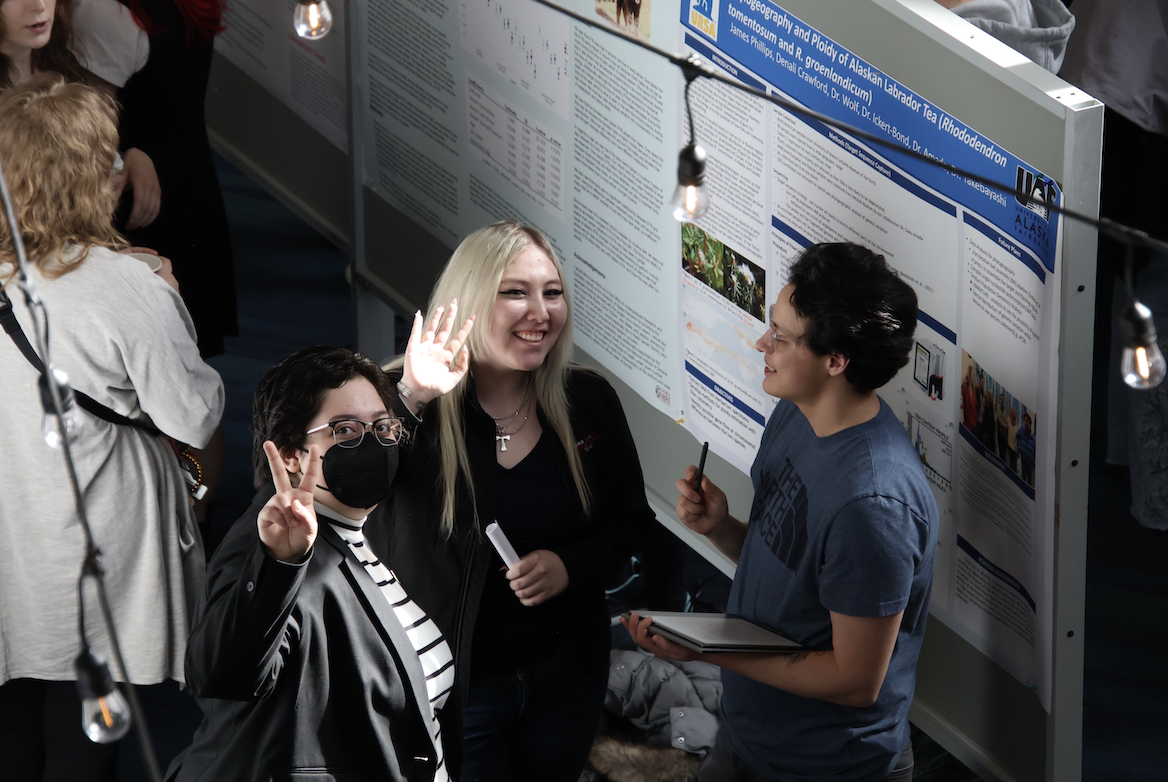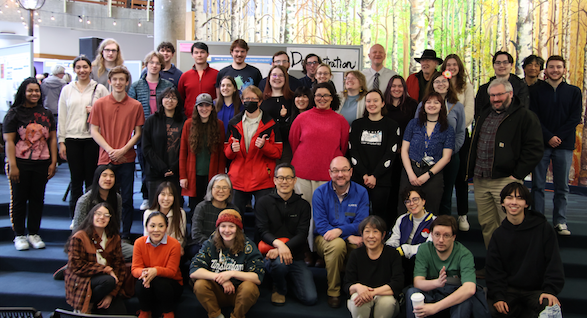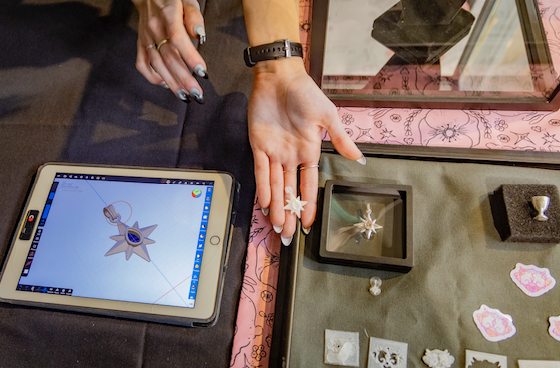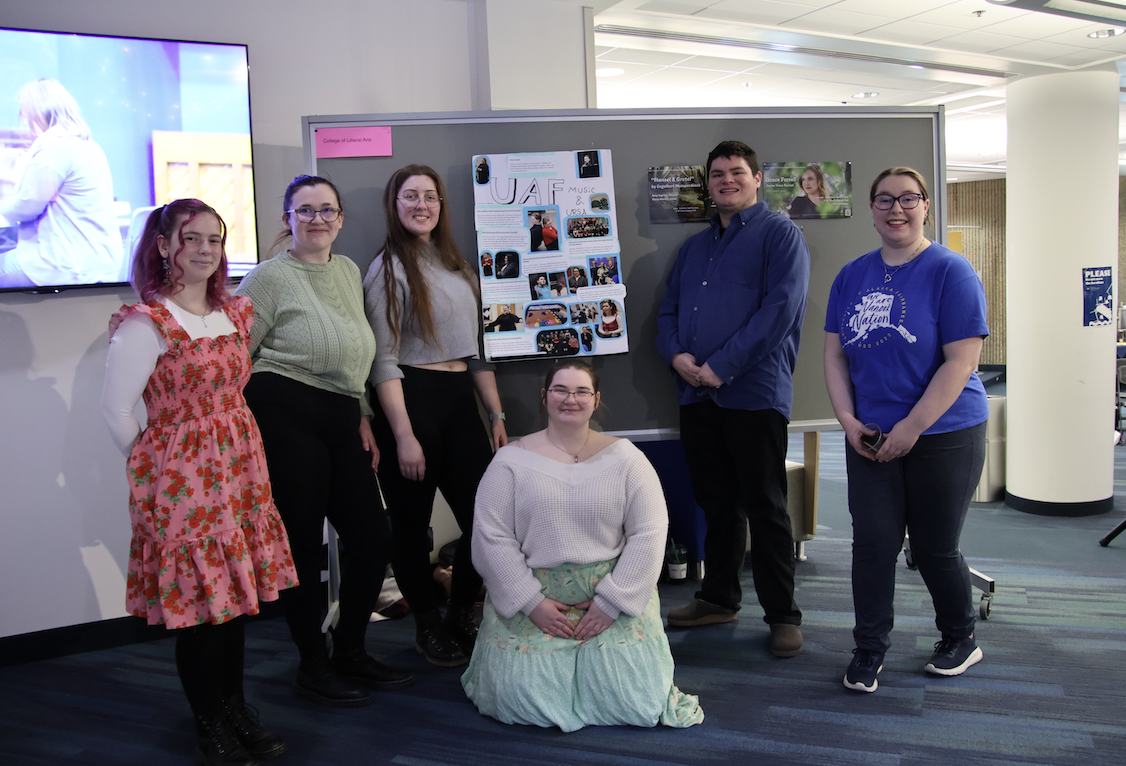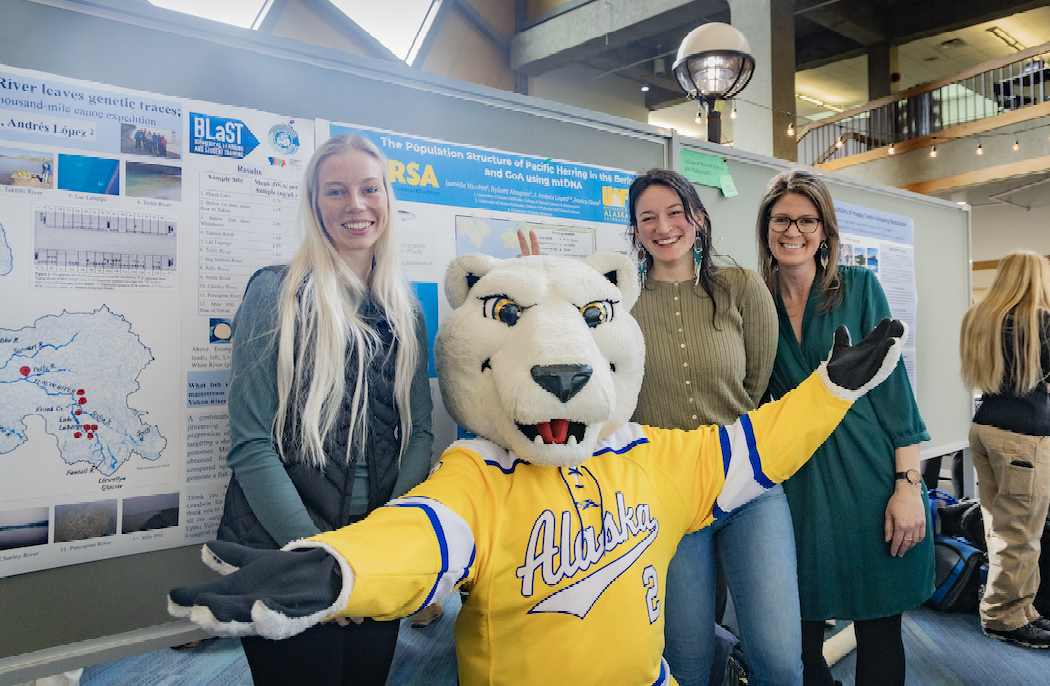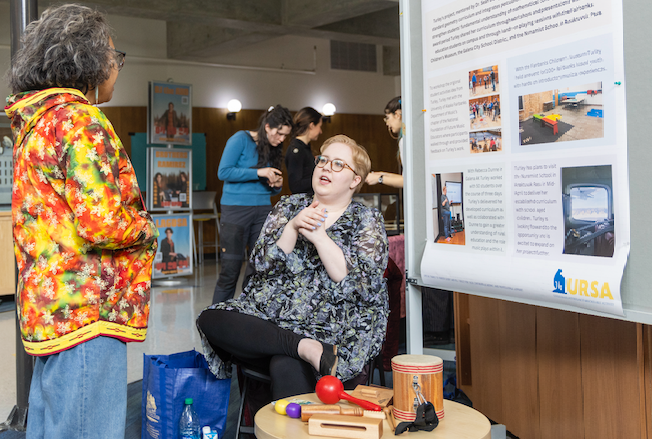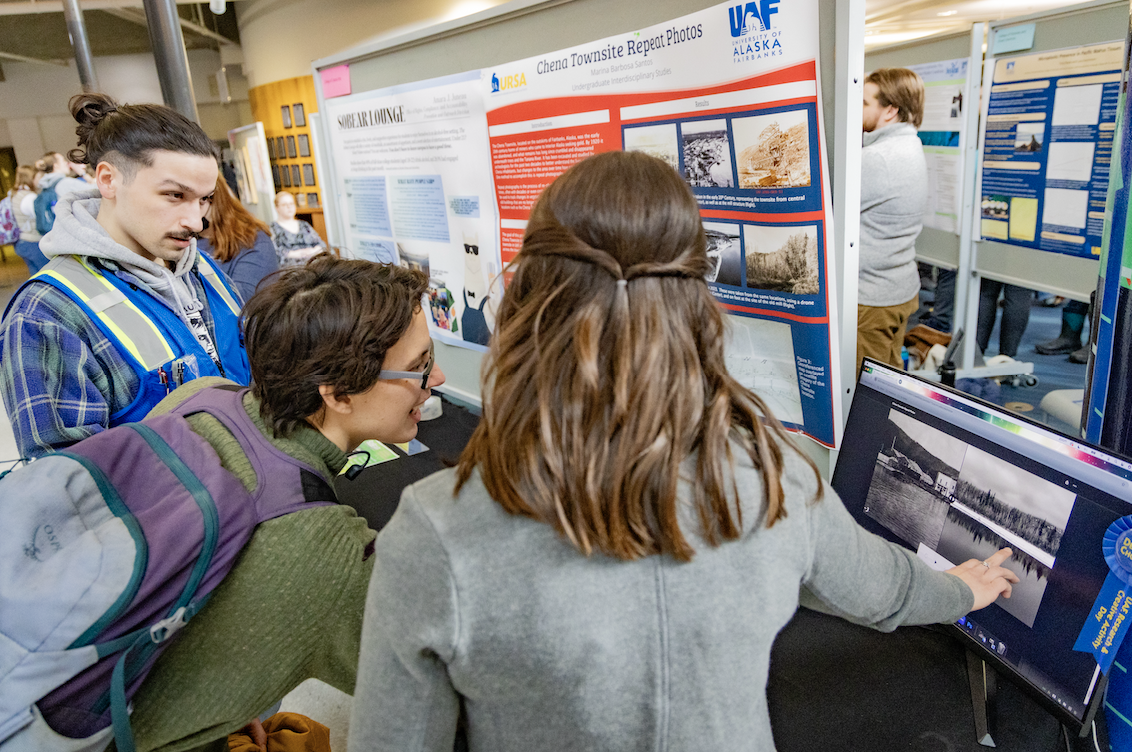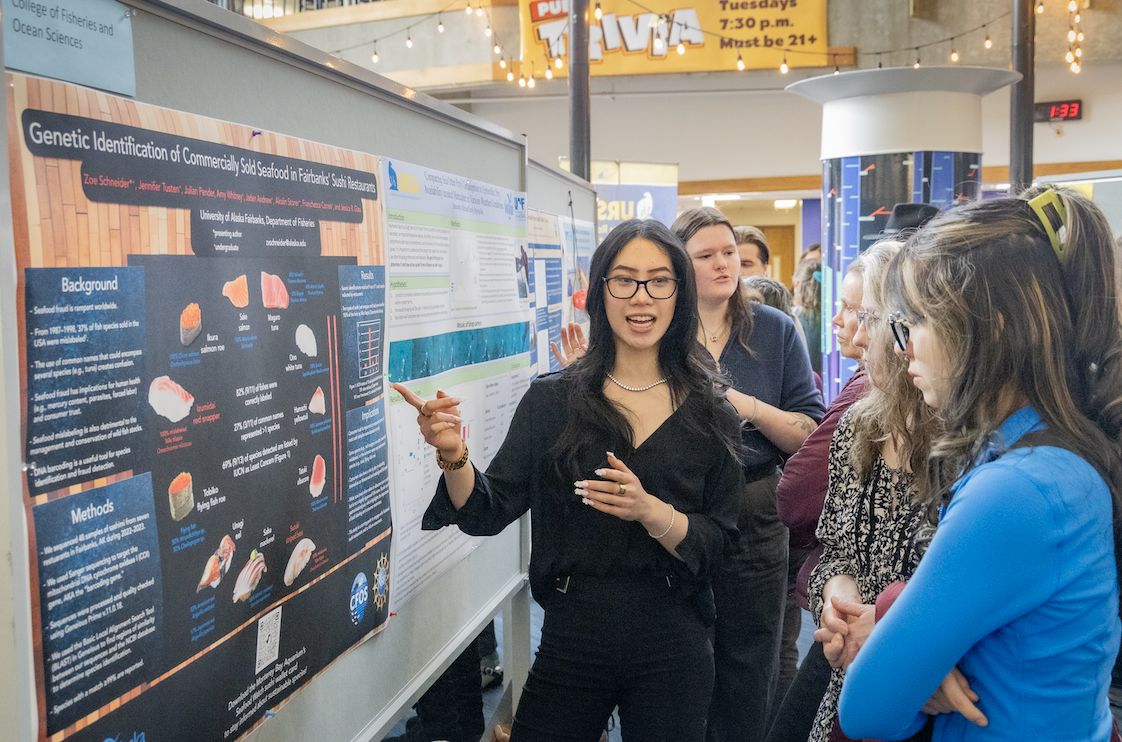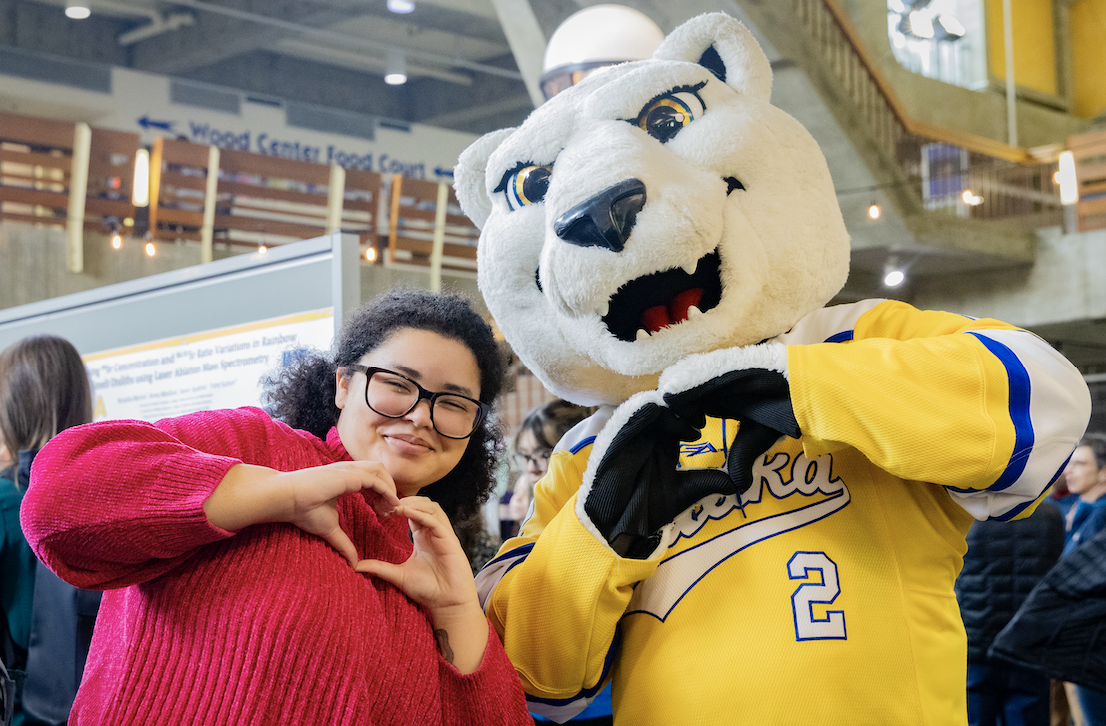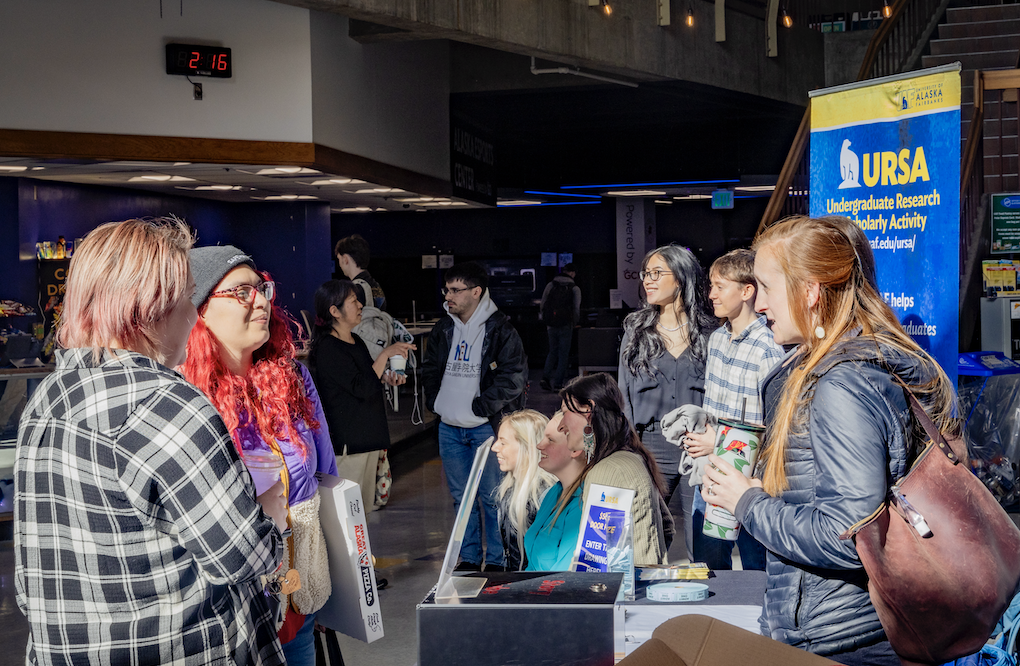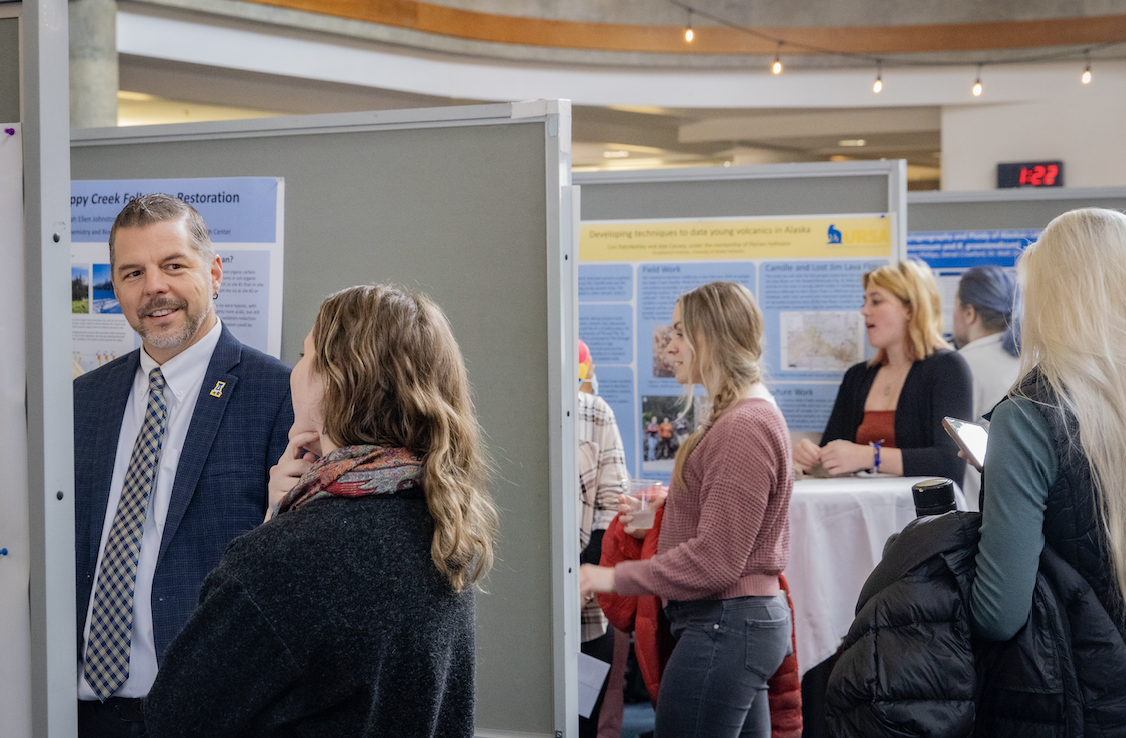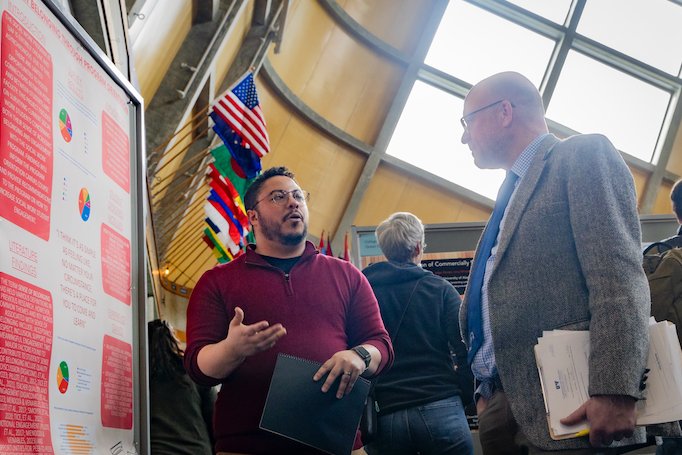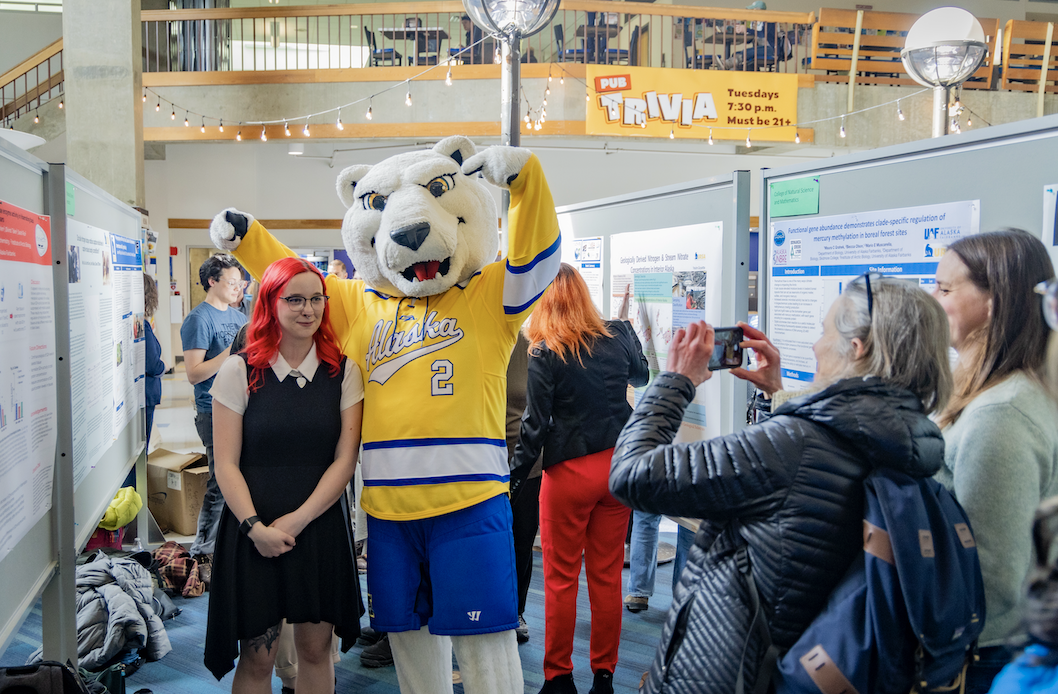2024 Research and Creative Activity Day
RCA Day 2024 Awardees
College of Business and Security Management
- Dean's Choice: Shaina Atcherian & Marcelo Ketzler-Lopez
College of Engineering and Mines
- Dean's Choice: Margaret McCormick, Dakota Peterson-Thompson, & Conor Sosebee
- Honorable Mention: Derek Dayan, Janet Felix, & Evan Wells
College of Fisheries and Ocean Sciences
- Dean's Choice: Tony Blade
- Honorable Mention: Isabelle Nicolier
College of Liberal Arts
- Dean's Choice: Marina Barbosa Santos
- Honorable Mention: Marina Gonzalez Mazo
College of Natural Science and Mathematics
- Dean's Choice: Maura Grahek
- Honorable Mention: Christian Bolton
| Presenter | Project | Poster |
|---|---|---|
|
Shaina Atcherian
|
Yukon Harmony Veterinary Clinic Business Proposal A hub and spoke veterinary clinic based in Fort Yukon, Alaska, that would provide preventative Veterinary services to communities in Interior Rural Alaska at no cost. |
Poster |
| Presenter | Project | Poster |
|---|---|---|
|
Audrey Eikenberry |
Electric Ferry Battery Charger and Data Logger JPEG Engineering’s Electric Ferry Battery Charger and Data Logger project aims to
devise a viable solution for Southeast Alaska's delicate and limited-capacity electrical
grids to |
Poster |
|
Derek Dayan |
Venus Seismic Instrumentation The project is to design, fabricate, and test a seismometer package that will be deployed on Venus by NASA. The optimal size, shape, mechanism, and weight of the package, including the windshield, will be investigated with the guidance of mentors at UAF and the NASA Glenn Research Center. |
Poster |
|
Kathryn Finley
|
Aeronautics Club Aircraft Design Research The UAF Aeronautics club designed and constructed a variety of different aircraft configurations. These aircraft were tested and analyzed to determine the various effects on aircraft performance and efficiency. The results were documented thoroughly for future iterations of the club to reference and utilize. |
Poster |
| Hunter Keller |
Plowmate: The Drillhole Saver Plowmate is a novel solution in mitigating the loss of a drill pattern under snow. When a storm is imminent, Plowmate is installed into each hole. After the storm passes, the drill pattern is quickly plowed. Plowmate is removed with the integrity of each drill hole remaining intact. |
Poster |
|
Margaret McCormick |
Winterization Design for Outdoor Particulate Collection Technology |
-- |
| Nick Samuel |
Improving Hydrogen Production Efficiency from Electrode Surface Modifications This project explores how surface modifications of the metal electrodes used in electrolysis can improve the efficiency of hydrogen gas production. Water electrolysis is a key player in providing clean energy for a greener future.
|
Poster |
| Presenter | Project | Poster |
|---|---|---|
| Samantha Allen |
Comparing Sea Otter Prey Consumption to Epibenthic Prey Availability around Mariculture
in Various Weather Conditions To determine if oyster farms influence sea otter foraging, I compared environmental parameters to prey in three oyster farms. I also looked at whether sea otters used oyster farms as opportunistic foraging areas during poor weather conditions and compared the abundance of consumed fouling organisms in farm and non-farm areas. |
Poster |
|
Jaden Andrew |
Genetic Identification of Commercially Sold Seafood in Fairbanks’ Sushi Restaurants To determine the truthfulness of seafood in Fairbanks, we sequenced various types of sushi from different sushi restaurants with Sanger sequencing to target the COI gene and compare it with the NCBI database to find regions of similarity. |
Poster |
|
Tony Blade |
Microplastic Presence in Pacific Walrus Tissues Examined microplastic presence in Pacific walrus muscle and blubber, as well as trends in age and sex. |
Poster |
| Emilie Entrikin |
Are Salmon Colonizing Northeast Alaska? I collected 132 passive eDNA samples from three Arctic rivers in the summer of 2023 in hopes to track the colonization of salmon in Northeast Alaska. I have been working in the lab with PCR and dPCR to find traces of chum and pink salmon and using the Dolly Varden as a test control. |
Poster |
| Amelia Knavel |
Diet Comparisons between length and sex of Fourhorn Sculpin (Myoxocephalus quadricornis) Samples of Fourhorn Sculpin were collected from the Beaufort Sea. Dorsal muscle samples, length, sex, and otoliths were taken from each sample. The muscle samples were prepared for carbon and nitrogen stable isotope analysis. Otoliths were set in resin, cut, and polished for aging and strontium stable isotope analysis. |
Poster |
| Paul Lecheung-Singleton |
Using an established morphometric model to assess field-based sexing of Arctic grayling Arctic grayling display sexual dimorphism in dorsal fin shape and size. A recent study established a reliable model for fish sex determination using morphometric measurements, but its application is time-consuming. Our objective is to assess the accuracy of field-based fish sexing using the established morphometric model as a reference. |
Poster |
| Rhayne Loggins |
Using eDNA to determine Humpback Whale Prey Identify the prey of humpback whales in Glacier Bay National Park and Preserve by preforming digital PCR on eDNA samples collected by feeding whales. |
Poster |
| Nivedita Menon |
Assessing 88Sr Concentration and 86/87Sr Ratio Variations in Rainbow Smelt Otoliths
using Laser Ablation Mass Spectrometry This study aims to understand Rainbow Smelt life history traits in Beaufort Sea's nearshore waters. Our objective is to analyze Rainbow Smelt otolith 88Sr concentrations and 86/87Sr ratios in marine and freshwater sites. We hypothesize that there are higher 88Sr concentrations and 86/87Sr ratios in marine otolith edges. |
Poster |
| Lillian Nelson |
What happens on the Yukon River leaves genetic traces; analysis of eDNA samples from
a thousand-mile canoe expedition In the summer of 2022, I collected eDNA samples on a six-week self-supported expedition along the upper one thousand miles of the Yukon River. While traveling along the upper half of the river, I was able to take samples in many different ecosystems and from different classifications of tributaries that contribute to the main flow of the Yukon. The Yukon and some of the tributaries are known for having high sediment loads. My first five samples were focused on the headwaters of the main Yukon, and sampling upstream and downstream of the two dams supporting the community of Whitehorse. After this, I sampled at the confluences of major tributaries. The samples were then transported back to Fairbanks following the expedition. The fish DNA was extracted from the eDNA filters, and I have been doing the genetics since. Eventually, the samples will be processed utilizing metabarcoding techniques to determine which fish species were present at the various sample sites. |
Poster |
|
Isabelle Nicolier |
The Population Structure of Pacific Herring in the Bering Sea and Gulf of Alaska using
mtDNA To inform sustainable management practices an extensive understanding of population genetic structure and diversity is needed. This project builds on previous work to analyze the population structure and genetic diversity of regional Pacific Herring stocks. By analyzing the control region 1 (COI) gene in the mitochondrial genome and comparing samples throughout Alaska's waters. |
Poster |
| Presenter | Project | Presentation |
|---|---|---|
| Steven Anderson Mari Ana Beks Olivia Buzby Alexia Devine Grace Farrell Ellie Martinson Lucy McWilliams |
Fairbanks North Star Borough School District Music Outreach with UAF Music Our Opera Workshop class performed an Outreach tour to high schools in this area, including West Valley, North Pole, and Lathrop High Schools. |
Video |
|
Marina Barbosa Santos |
Chena Townsite Repeat Photos This project utilizes repeat photography to support archeological efforts at the Chena Townsite, and to understand how the landscape has evolved since the town was abandoned. The project endeavors to contribute to the preservation of history, public education, and our understanding of land use changes. |
|
| Reily Dixon |
Cognitive Cryogenics: Visual Metaphors for Human-Environment Relationships Cognitive Cryogenics: Visual Metaphors for Human-Environment Relationships focuses on gathering information on Alaskan glaciers, and the tendencies of local people to create a visual metaphor between the land and its inhabitants. This project highlights analogies which allow the audience to experience greater awareness and understanding of relationships to their environment. |
Video |
|
Marina Gonzalez Mazo |
H&H Bunnyson is a charm worn as a necklace or an insignia. It is crafted in 14k gold and holds a 0.35 ct diamond with grey coloration and a pearl cut. The jewel was designed in Blender, a free and open-source software. I then printed
the sculpture with the help of the 3D printers in the UAF Makers Space, using Polycast
filament. A new plastic filament designed to burn without residue was meant to replace
wax in the The design features two bunnies facing each other, holding the diamond together with their paws. They sit on top of a heart shape and have wings on the side. I wanted the jewel to look like a coat of arms inspired by royal and religious insignias. A symbol of status and wealth. It is a soft and whimsical design, almost like it was from a fairytale. The rabbits make a consistent apparition in my BFA thesis show as I use them as a euphemism for sexuality and devotion. With this piece, I wanted to create an heirloom jewel that would hold my BFA show in a nutshell, a insignia for reaching my commencement as a professional artist. |
|
| Amara Juneau |
SoBear Lounge |
Poster |
| Charles Stark |
Student Belonging through Program Orientation |
Poster |
| Beatrice Turley |
Understanding Introductory Geometry Through Music, Movement, and Listening Turley's project, mentored by Dr. Sean Dowgray, centers around the Alaskan public
school standard geometry curriculum and integrates percussion instruments into the
lesson plan to strengthen students' fundamental understanding of mathematical concepts |
Poster |
|
Japanese Language Speeches |
Speech Title | Recorded Speech |
|---|---|---|
| Chel Boue | Notre Dame Cathedral (ノートルダム大聖堂) |
Video |
| Gavin Brennan | Japanese and Computer (日本語とコンピューター) |
Video |
| Daniel Kahle | Sleepless Night (眠らない夜) |
Video |
| Julia Lockwood |
Nanny Au Pair |
Video |
| Noah Morgan |
My Cat |
Video |
| Paradise Porter |
What I Learned From My Mom |
Video |
| Gavi Ximenez | When Hiragana Turned to Kanji (ひらがなが漢字に変わる時) |
Video |
| Presenter | Project | Poster |
|---|---|---|
| Josephine Beauchamp |
The insecticide Safari 20SG inhibits the growth of Neodothiora populina, an emerging
fungal pathogen in trembling aspen Testing at which concentration the insecticide Safari 20SG insecticide inhibits the growth fungal pathogen Neodothiora populina. |
|
|
Christian Bolton |
Effects of Hypoxia on Blood Osmolarity in Antarctic Fish Species Temperature is increasing in the Southern Ocean surrounding Antarctica and as a result, oxygen levels are also decreasing, potentially affecting native fish species. I am measuring blood osmolarity to determine if hypoxia affects the ability of Antarctic fish to regulate blood osmolarity. |
Poster |
| Madelyn Brennan |
Mitochondrial succinate dehydrogenase enzyme activity in hibernating black bears Studying mitochondrial succinate dehydrogenase enzyme activity in hibernating black bears in liver, cardiac and kidney tissue. |
Poster |
| Ada Causey Cori Patchkofsky |
Developing techniques to date young volcanics in Alaska Determining the timing of past eruptions is a crucial aspect of studying volcanic activity. This project aims to develop techniques to date past eruptions using 40Ar/39Ar dating of the Camille and Lost Jim flows in Alaska via the use of a mass spectrometer. |
Poster |
| Molly Cook |
Do bulk nitrogen isotope ratios capture declines in captive muskox body condition? We were interested in studying muskox bulk nitrogen isotope ratios to see if these values capture declines in body condition. We were particularly interested in using archived serum from muskox at the University of Alaska Fairbanks Large Animal Research Station from 2009-2010 when there was a decline in the body condition of some individuals due to deficiency in trace minerals. Nitrogen isotope ratios can be analyzed to assess protein balance in animals. Since the lighter isotope of nitrogen (14N) is preferentially excreted in urine, the heavier isotope of nitrogen (15N) is enriched in tissues. As a result, we expect to see a decrease in N15 ratios when an animal is in a state of emaciation. |
Poster |
| Denali Crawford James Phillips |
Phylogeography and Ploidy of Alaskan Labrador Tea (Rhododendron tomentosum and R.
groenlandicum) Our goal is to detect if there is a historical signature of gene flow in the sympatric area. Additionally, we will investigate if these two species are unable to interbreed due to ploidal differences in the populations where they coexist. In the future, the generated sequence data can be used to address demographic history of Rhododendron tomentosum and R. groenlandicum. |
Poster |
| Jedidiah Fincher Kendall Martinez |
The Influence of Ground Cover and Soil Conditions on Blueberry Productivity A study of the effects of ground cover and soil conditions on Blueberry productivity at Bonanza Creek Long Term Ecological Research Station. |
Poster |
|
Yesim Goyette |
The Influence of Geologically Derived Nitrogen on Stream Nitrate Concentrations in
Interior Alaska The high concentration of nitrate in Fairbanks drinking water cannot be explained by anthropogenic or environmental factors. I am examining the possibility of geologically sourced nitrogen through analysis of nitrogen content and isotopic composition in rock and how it spatially correlates to stream nitrate concentrations.
|
|
|
Maura Grahek |
Functional Gene Abundance among Boreal Forest Sites I will be measuring the abundance of functional genes associated with the microbial production of methane and carbon dioxide. Digital polymerase chain reaction will be utilized to obtain complete quantification of these genes. |
|
| Kristina Head Shannon Williiams |
Geo Learning Community: Student Community and Belonging The Geo Learning Community (Geo LC) provides support for geoscience majors who are from typically underrepresented groups in STEM education. We support these students by offering tutoring, contact with faculty and opportunities at UAF, and social activities that provide a chance for students to build community outside of the classroom. |
Poster |
| Theodore Krauss |
Assessing Salmon Habitats on the Banks of the Chena River in Fairbanks, Alaska UAF student and Tanana Valley Watershed Association investigate different types of riverbanks including natural, bioengineered, and riprap banks in order to assess the extent to which they contribute to or detract from macroinvertebrate abundance and salmon habitation on the Chena River after river break up. |
Poster |
| Luke Lawson |
Grasshoppers in Wood River: A relic population of the presumed extinct Rocky Mountain
Locust? Investigation into the taxonomy of a grasshopper outbreak in rural Alaska. |
Poster |
| Xochitl Muñoz |
A new look at the mammalian fauna of the Prince Creek Formation, North Slope, AK The Prince Creek Formation is famous for polar dinosaurs, but it also contains ancient mammals, four species of which were previously known from studying teeth. However, we have found a greater diversity and identified nine morphotypes of mammals from jaws and skeletal material, more than doubling the previous known number. |
Poster |
| Ryan Owens |
The contribution of source materials to the dissolved organic matter of Smith Lake Evaluation of the sources of biodegradable dissolved organic matter in Smith Lake in the context of a changing climate and hydrologic cycle. |
Poster |
|
Leila Shubair |
Macroinvertebrates Across Various Vegetation Sites Along the Chatanika River Our project was to look at the salmon fry diet and see what was present in the Chatanika River. We wanted to see if erosion of the rivers would be a problem to the salmon fry diet. To better understand how well the salmon population is doing regarding climate change. |
Poster |
| Jessie Skalisky |
Invasive Plant Seedbank Development After Wildfire in Alaska’s Boreal Forest Wildfire and invasive species are increasing across Alaska as the climate changes. My study focuses on the development of an invasive species seedbank in soils from burns in Interior Alaska. What species of seeds are there and what does this mean for the vulnerability of Alaska in the future? |
Poster |
| Bree Smith |
Extracting Ancient DNA From the North Slope Eight samples of ancient spruce DNA were found frozen on the North Slope. The samples are about 80,000-130,000 years old. 50,000 years ago, the North Slope was glaciated. We have successfully extracted DNA from 1 sample. We will conduct future extractions on the remaining samples and identify their species. |
Poster |
| Iva Thomason |
How does a permafrost lake influence downstream carbon cycling? The Arctic is warming at nearly twice the rate of the mid-latitudes. Due to this warming, there are drastic changes in the environment, including in waterways. Permafrost releases ancient organic carbon (OC) into the modern environment as it thaws in warming Arctic temperatures. This permafrost has been found to be highly available for microbes to decompose into CO2 and CH4 representing a positive climate feedback. By measuring the rate of biodegradable dissolved organic carbon (BDOC) consumption by microbes in lakes and streams around the Fairbanks area, we can assess the impact of seasonal changes and permafrost thaw on BDOC. |
Poster |
| Grace Veenstra |
Winter Conditions of Happy Creek following Restoration Following a restoration project of Cripple Creek, we are still learning about the impacts it had on the creek ecosystem. Using water quality and water sample data, this poster offers insight into the current winter conditions of Happy Creek, and what these conditions imply for fish survival under the ice. |
Poster |
RCA Day 2024



